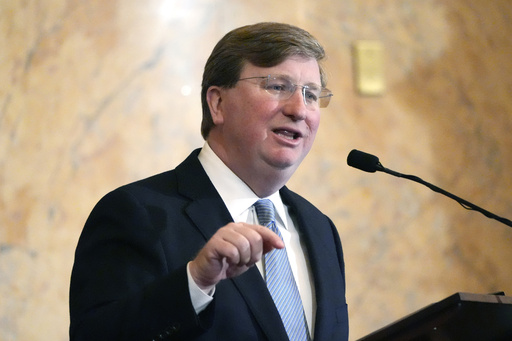Jackson, Mississippi — On Wednesday, Tate Reeves, the Republican governor of Mississippi, reiterated his intentions to persuade lawmakers to eliminate the state income tax. This push comes despite concerns that federal budget cuts could impact state finances after Donald Trump resumes his presidency.
Mississippi ranks among the poorest states in the U.S., heavily relying on federal funding, which amounts to billions annually. A significant portion of these funds is allocated to Medicaid, a federal program that provides health insurance for low-income citizens.
Reeves suggested that if the federal government intends to curtail its contributions, it should grant states greater flexibility regarding which populations should be eligible for Medicaid. He emphasized that it would be more manageable for states to cope with reduced funding if they had the power to make these determinations.
During a news conference, Reeves, who has backed Trump since his election in 2016, mentioned that Trump recently selected Elon Musk and former presidential candidate Vivek Ramaswamy to spearhead an initiative aimed at potentially decreasing government expenditure and resizing the federal government.
According to data from the nonpartisan Legislative Budget Office, approximately 42% of Mississippi’s budget for this fiscal year, which began on July 1, comes from federal sources, equating to around $13.2 billion of a nearly $31.7 billion budget. Medicaid alone accounts for about $6.5 billion of that federal funding.
This year, the state’s individual income tax is projected to yield around $2.1 billion, which falls short of the anticipated $2.9 billion from sales tax revenues, as reported by the budget office.
Mississippi is already taking steps to lessen its personal income tax due to legislation signed by Reeves in 2022, which will eventually reduce the top tax rate to 4% in the next two years.
Reeves has consistently maintained that to be competitive with states like Florida, Tennessee, and Texas—none of which impose a state income tax—Mississippi must aim to eliminate its income tax altogether. With the Mississippi Legislature under Republican control, House Speaker Jason White has expressed his support for this initiative, while Lt. Gov. Delbert Hosemann is proposing a reduction in the 7% sales tax on groceries.
In July, Arkansas’s Republican Governor, Sarah Huckabee Sanders, enacted legislation that will lower her state’s income tax to 3.9%. Louisiana’s lawmakers are currently engaged in a special session to assess possibilities for cutting the state’s income tax, potentially to 3%.
Reeves commented on the competitive landscape for attracting new business and industry, highlighting the necessity for Mississippi to remain tax-competitive to sustain economic growth.
Additionally, on Wednesday, Reeves unveiled a plan allocating $110 million toward infrastructure enhancements focused on industrial potential, as well as initiatives for workforce development, tourism, and conservation. This funding will come from state resources and various partners, including the Appalachian Regional Commission and the Delta Regional Authority, as well as federal allocations established after the Gulf of Mexico oil spill in 2010.
Reeves stated the importance of preparing Mississippi to attract industries seeking new development locations. He added, “Most of the challenges we have in Mississippi could be solved by every single person here having both the skills that they need and the opportunity for a job that pays 60- or 70- or $80,000 a year, and that’s what we’re focused on.”




